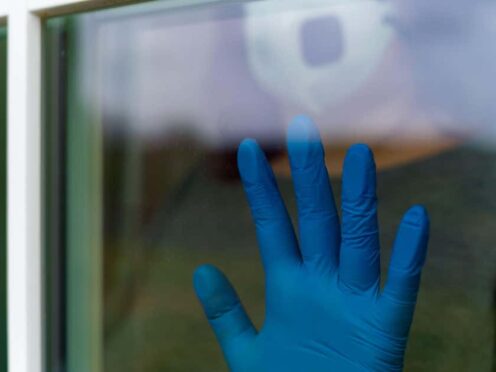Restrictions on families visiting their loved ones in care homes during the pandemic felt cruel and punitive, the UK Covid-19 Inquiry has heard.
The inquiry was told there had been more than 50,000 deaths related to the virus in care homes across the UK in the pandemic.
The first preliminary hearing for the inquiry’s investigation into the care sector – module six – was being held in London on Tuesday.
Public hearings where evidence is heard are not expected for this module until spring 2025.
At Tuesday’s hearing, Jacqueline Carey KC, counsel to the inquiry, said the pandemic had had a “devastating impact” on those living and working in the adult social care sector.
Listing official figures recorded for care home residents across the four nations in slightly varying time periods between 2020 and 2022, she said there were more than 50,000 deaths related to Covid-19.
Ms Carey said: “The decisions that may have contributed to those figures will doubtless be examined in module six. But it is not just a question of statistics and data.
“Each number represents the loss of a loved one, often, as we will hear, in circumstances where they were not accompanied by family and friends saying goodbye at bedsides, but they died surrounded by PPE (personal protective equipment) and by the imposition of visiting restrictions which prevented or inhibited them dying in the company and presence of those who loved them.
“And so, whilst those tragic statistics from care homes may have made the headlines, the impact of the pandemic was felt not just in residential and care homes but also more widely across the adult social care sector.”
Our first preliminary hearing for Module 6, examining the Care Sector across the UK starts today at 10:30am.
Watch it on our Inquiry 📺YouTube channel (with a three minute delay) 👇👇https://t.co/n03rrwvjvU pic.twitter.com/MJ0tsPxjwb
— UK Covid-19 Inquiry (@covidinquiryuk) March 19, 2024
Module six is set to examine the impact of the pandemic on the publicly and privately-funded adult social care sector in England, Wales, Scotland and Northern Ireland – considering the consequences of government decision-making on those living and working in the sector.
The scope will include adult care and residential homes including care provided in the home – known as domiciliary care, and will look at the care of adults of all ages in the sector, rather than solely the elderly.
It will consider decisions taken to free up capacity in hospitals by discharging patients into adult care and residential homes and the capacity of the sector to respond to the pandemic.
In looking at the management of the pandemic in such settings, the inquiry will consider infection prevention and control measures, Covid-19 testing, the availability and adequacy of PPE, and restrictions on access by and to healthcare professionals and visits from loved ones.
Anna Morris KC, representing Covid Bereaved Families for Justice (CBFFJ), said the issue of visiting restrictions was “a matter of utmost public concern during the pandemic and is a matter of great concern to our families”.
Urging it to be considered as a distinct issue, she told the hearing: “At its heart, the issue underlines the importance of family, community and dignity in death and bereavement during a pandemic.
“But, given the obvious impact on residents who were particularly vulnerable when not receiving visits from their loved ones, such as those with dementia or learning disabilities, the inquiry is invited to include visits from loved ones as a distinct issue, and not only as an aspect of infection prevention and control.”
Brenda Campbell KC, on behalf of Northern Ireland Covid-19 Bereaved Families for Justice, said “far too many” of the deceased had been “cut off from their families and isolated during the pandemic”, adding that the importance of family contact and the negative effect of visiting restrictions “can’t be overstated”.
She told the hearing: “In many cases, the restrictions imposed on visiting were cruel and felt punitive and failed to take into consideration the real importance of family relations and social interaction.”
The module will also consider the use of Do Not Attempt Cardiopulmonary Resuscitation (DNACPRs) notices and communication with residents and their loved ones about a resident’s condition and treatment including discussions and decisions about such notices.
Jane Townson, on behalf of the National Care Forum, Homecare Association, and Care England, urged the inquiry to extend the scope of module six “beyond residential care homes and a limited view of home care”.
She said social care “encompasses a broad and complex spectrum of community-based services, supported housing, assisted living, and home care for individuals of all ages, with a wide range of needs, including physical disabilities, learning disabilities, autism, mental health conditions, brain injuries, and more”.
A failure to investigate these experiences alongside the workforce which supported them “would be a grave oversight, undermining the very purpose of this inquiry”, she added.
Ms Carey said while it might be that “the pandemic threw a harsh and painful light on issues such as pre-pandemic underfunding, and the undervaluing of the adult social care sector”, the module is not focused on those “wide-reaching and historic concerns and problems” but rather on the specific impact of the pandemic.
Samuel Jacobs, on behalf of the Trades Union Congress (TUC), said this approach “is mistaken”.
“At the very least, we urge this module to gather the evidence and for you, my Lady, to proceed with an open mind,” he said.
“The conclusion of a full and fearless inquiry might ultimately be that the roof needs to be fixed. That a problem is historic does not mean that it is not relevant to pandemic response and it may mean that a recommendation addressing it is desperately needed.”
As the hearing concluded, inquiry chairwoman Baroness Heather Hallett said she will issue her determination on the module’s scope once she has considered both the oral and written submissions from core participant groups.
